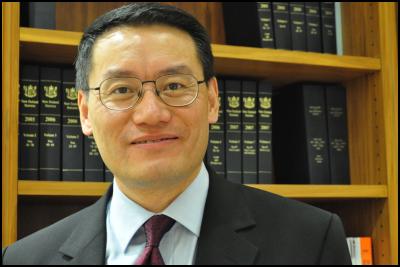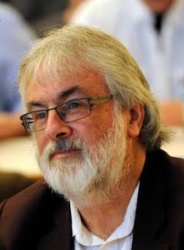Scoop's "Meet The MPs" Project: Raymond Huo
Scoop's "Meet The MPs" Project: Motoko Kakubayashi and Agnes Ginestet Talk To Labour’s Raymond Huo
Scoop's "Meet The MPs" Project: Raymond
Huo

Click for big version
-
Scoop Audio: Labour Party’s vision of
strong and inclusive community is very important to
everyone. That is why Mr Huo says he shares that sort of a
passion.
The two main reasons for his standing as a candidate for the Labour Party were the encouragements given by the New Zealand Asian community, as well as his upbringing in China in a family of medical doctors.
He became an MP after working in the legal and media fields. Being a list MP means that “you belong to everybody”, he says.
“For me in particular, I am Labour Party’s first MP of Chinese ethnicity. So I feel obliged to provide my services to the overall Chinese community nationwide (...) You have to travel quite extensively nationwide to make yourself available to attend all sorts of different functions, meetings and dialog.”
Mr Huo has been trained not to be afraid of challenges when working as a journalist and as a lawyer, and politics is nothing but challenges, he says.
Advertisement - scroll to continue readingAlong with other roles, his portfolio includes promoting cultural exchange and integration.
“I don’t think it’s in the best interest of new New Zealanders or migrants if they stick to themselves, within their little patch, eat their own ethnic food, and read their own ethnic books or newspapers. It’s not terribly healthy, so what I ‘m doing is I try to build up a bridge between the two communities.”
DOWNLOAD MP3
Biography
People have a hard time remembering Raymond Huo's name, so the 45-year-old Labour list MP introduces himself as Mr HUO, the Highly Unique Oriental.
Years before entering the New Zealand Parliament, Mr Huo grew up in a family of medical doctors in China.
His parents moved their family from the large city Beijing out to a rural area where they volunteered to help the community fight a parasitical disease, he says.
“As a little boy I witnessed how my parents helped the locals and I guess subconsciously I was exposed to what, in hinder sight, I realise, a kind of a concept of social justice, equality and equity.”
This made Mr Huo realise how important social justice and equality were, and would later influence him to enter politics.
But the first part of his career took place in China, where he worked as a lawyer.
“I worked for a special project in association with the UN and the World Bank for about 10 years, and this gave me the opportunity to travel extensively in the USA, Japan and France.”
In 1994, Mr Huo migrated to New Zealand, where he became an Asian affairs reporter for the New Zealand Herald.
He co-edited and translated Chinese-English dictionaries, and obtained two degrees in law and political communication before returning to a legal profession.
“As an Asian turned New Zealander who practiced as a barrister and solicitor in Auckland, I did act for quite a few Asian clients so I was actually encouraged by the Asian community leaders and members to stand as a candidate for the Labour Party.”
Mr Huo was elected a list MP for Labour at the last general elections in November 2008
He is a member of the finance and expenditure select committee, a spokesperson for the law commission, a spokesperson for statistics, and an associate spokesperson for ethnic affairs.
He lives in Auckland with his wife and two children, but works from Monday to Thursday in Wellington, he says.
Q And A
1. What is your view on the decision taken by the
Government in relation to the smacking referendum in terms
of what it says about NZ democracy?
By providing the
answer with a yes or no, you pretty much have no idea what
you are talking about. So that referendum was doomed to fail
in the first place. So what I cannot understand is how come
the government ought spend like 9 million dollars for doing
something which would achieve nothing. And they knew that
from the very beginning. The Prime Minister made it pretty
clear that the law as it is now works pretty well, so what
he intends to do is to have another go with guidelines
rather than look at the so-called anti-smacking law itself.
2. What is your view on the merits of MMP vs FPP? Should
there be another referendum on the subject and what is your
preferred outcome?
Before, New Zealanders had debated
very fiercely and passionately about MMP or FPP, and which
way this country should go for. And then that led to the
current electoral system being put in place (...) NZ is a
multicultural nation. We need a system to reflect that, and
at the moment MMP is working very well.
3. Name a dream team of seven members of Parliament - people who you think exemplify how an MP should conduct him/herself. Your list of seven can only include three members of your own party.
From the Labour Party :
• Phil Goff, leader
of the opposition, who signed the first free trade agreement
with China as a trade minister
• David Cunliffe,
teamleader of the finance and expenditure select
committee
• Lianne Dalziel, chair of the commerce
committee
From the National Party :
• Simon Power,
Minister of Justice
• John Key, Prime
Minister
• Paul Hutchison, Chairperson of the health
committee
• Nikki Kaye, who took part in a project
promoted by the New Zealand and China Friendship Society
Motoko Kakubayashi and Agnes Ginestet are journalism students at Massey University
ENDS


 Martin LeFevre - Meditations: In A Global Society, There Is No Such Thing As “National Security”
Martin LeFevre - Meditations: In A Global Society, There Is No Such Thing As “National Security” Binoy Kampmark: Secrecy And Virtue Signalling - Another View Of Signalgate
Binoy Kampmark: Secrecy And Virtue Signalling - Another View Of Signalgate Gordon Campbell: On The Americanising Of NZ’s Public Health System
Gordon Campbell: On The Americanising Of NZ’s Public Health System Ian Powell: Trumpian Health Leadership
Ian Powell: Trumpian Health Leadership Eugene Doyle: Disruption - Historians Challenge Russophobic Propaganda
Eugene Doyle: Disruption - Historians Challenge Russophobic Propaganda Ramzy Baroud: War, Doublethink, And The Struggle For Survival - Geopolitics Of The Gaza Genocide
Ramzy Baroud: War, Doublethink, And The Struggle For Survival - Geopolitics Of The Gaza Genocide